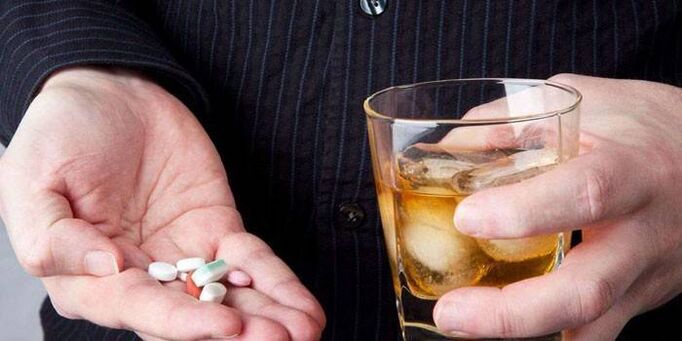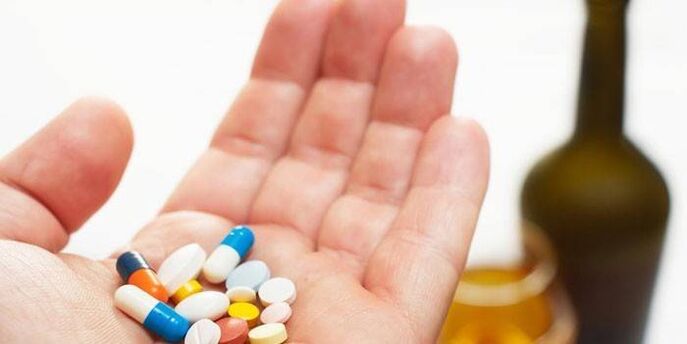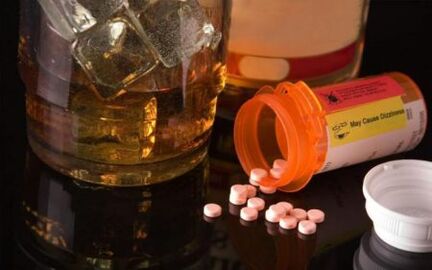Alcohol and antibiotics are mutually exclusive concepts, and their simultaneous use will cause irreparable health harm.Antibiotics are treated with many serious diseases, even those considered incurable 100 years ago.They successfully destroy and kill all kinds of viruses and bacteria, and are still the most effective medical drugs today.They are used with alcohol to cause resuscitation.Therefore, when the drug cycle ends, the doctor needs to clarify when you can drink any alcohol after drinking antibiotics.

Antibiotics of our time
The effectiveness of antibacterial drugs is difficult to overestimate because the number of life-saving cannot be counted due to these bitter drugs.Modern pharmacological capabilities produce a large number of these essential drugs.
Medicine has reached such a high level that their intake is already safe for young children and even for certain types of antibiotics targeting babies.The process of taking antibiotics ranges from several days to 1-2 months.Doctors are very strongly advised not to interrupt it and treat it from day one to last day, observe preventive measures, and even more taboos for all types of alcohol application.
The particularity of antibiotic treatment is that it should be taken over time and in a certain number of days.Certain medications cannot be mixed and consumed strictly before meals or in the morning, day or night – generally, dosage and frequency are observed.If these problems cause difficulties, it is best to consult a therapist rather than perform non-systemic treatment with them.
Regarding the effectiveness of antibiotics, the topic has also been closed.The non-systemic use of antibiotics that imply antibiotics is at high risk.And don't forget that these drugs themselves have side effects.They are absolutely incompatible with alcohol.Therefore, it is unacceptable to use the drug in combination and pass through one or two glasses simultaneously during the treatment prescribed by the doctor.
Fun can end sadly
If someone still thinks you can take antibiotics while drinking alcohol, convince such a person with the opposite view.It is necessary to advise him to read any comments on antibiotics, where he writes the high risk of alcohol and drugs in black and white.These are not empty words.The most harmless thing is the useless therapeutic factor of taking drugs.Well, if it turns out to be so, there is no other situation.
There are enough examples of the continued continuation of the banquet after using alcohol antibiotics “snacks”.In many cases, only the resuscitator can reduce the "level of fun" and save the lives of the wronged patient.There are many dangers of combining these two mutually exclusive substances.
Antibiotics are structurally complex natural or chemical (synthetic and semi-synthetic) substances.If the therapist prescribes intake, some complex infections in the body are rampant, and alcohol (its use) can disrupt the clinical condition.
The spread of antibiotics and alcohol based will cause additional health harm:
- During the disease, the body becomes weakened, immunity is suppressed, and drinking will not be used in any way.
- Antibiotics themselves do not affect the kidneys and heart in the best way, disrupting the balance of gut microbiota.
- Alcohol can be used with drugs that can cause irreparable health harm.The kidneys and liver may not be able to cope with increased loads, threatening liver or renal failure.
- If antibiotic intake is elucidated, alcohol must be excluded for a certain period of time.Otherwise, all treatments will be performed on the drain.Due to the combination of drugs and alcohol, the virus will not be destroyed, but will increase drug resistance.
- We will have to change antibiotics to a new generation of drugs that bring additional risks.
- If you consume alcohol during treatment, the bacteria can immunotherapy process, and then relax on the horizon with a very sad ending - clinical death of sepsis.
Therefore, it is best to think a thousand times before drinking antibiotics with a glass of wine.
Direct threat to health

In addition to the above dangers, taking such drugs as well as alcoholic beverages (even high-quality) threatens:
- Dizziness;
- The cloud of rationality;
- Nausea and vomiting;
- Allergic reactions;
- Migraine.
Taking alcohol together with medications leads to violations of almost all body systems.The immune system under the influence of alcohol will be further suppressed.Another unpleasant moment is the significant increase in alcohol.If a person hangs around faster, the hangover syndrome will last longer than usual and have other unpleasant consequences.but.Antibiotics are included in the drug group category, so enthusiasts who combine with alcohol and drugs will develop a persistent addiction to antibacterial agents.In other words, future treatment may not work.
Similarly, when alcohol and antibiotics enter the body, they break down into simple compounds.The fact that certain molecules of drugs are consistent with alcohol molecules pose a great threat to health.The human system treats alcohol as a drug and begins to react.
The doctor knows everything
Of course, one way or another during treatment, you have to enter the usual rhythm of life, but it is highly recommended that you work with the attending physician to influence the issue of caution.That is, is it possible to drink alcohol after antibiotics and when?How many days should you go through after using the last tablet or capsule?In a few hours, can it drink a certain amount of wine or beer?When and how much do you use high doses of alcohol?After the final cure, all these questions should be heard from the patient when the therapist is received.
One person lifts the ban on his own, and a person's health is largely a risk (rather than a soreness, you can cause several), in some cases - life.
Doctors answered a question about when to drink alcohol after antibiotics, that is, how long after they focus on the terminology of medication, excretion from the body, dosage and treatment time.Well, of course, it can be harmful if you drink alcohol on a horse dose.The doctor determines the time range for each patient separately.Any doctor fully understands that no one can be brought into a comb.
Everyone has their own body and prescribed treatments.Power produces a large list of these drugs, and each drug has its own pharmacological properties.Some are quickly discharged from the body, while others persist in the liver, tissues, blood, etc.Therefore, an experienced doctor will never immediately say when to drink.He will analyze all risks and will only issue a judgment after a thorough analysis.
Better to wait
Many experts in the medical field believe that the minimum abstinence of alcohol after completing antibiotics is 10 days.It's best to wait for this day.Until the above period, it is impossible to tempt yourself with a glass of alcohol.Even if it is indicated in the comments for 7 days, it is not that antibiotics leave the body completely.We remind you - everyone and his health - to remind you separately.Therefore, the time of abstinence is obliged to determine the doctor.Failure to comply with the advice can threaten the serious consequences written above.

Ignore the doctor's instructions to independently close the issue of allowing alcohol content and start taking alcohol immediately after treatment - to resolve the following issues:
- The manifestation of allergic reactions, sometimes in severe forms;
- There will be strong poisoning;
- Previous treatment processes will be ineffective (the appointment of other antibiotics will cause the microorganism to reproduce, and how much the repeated process will last is unknown);
- The remaining antibiotics in the body, as well as the percentage of alcohol, will greatly impact important organs, and then in the recent past, will require healthy organs.
It is very simple to avoid these and other consequences.You only have to wait for a ten-day term, or even better, please conduct a detailed consultation from the attending physician.























